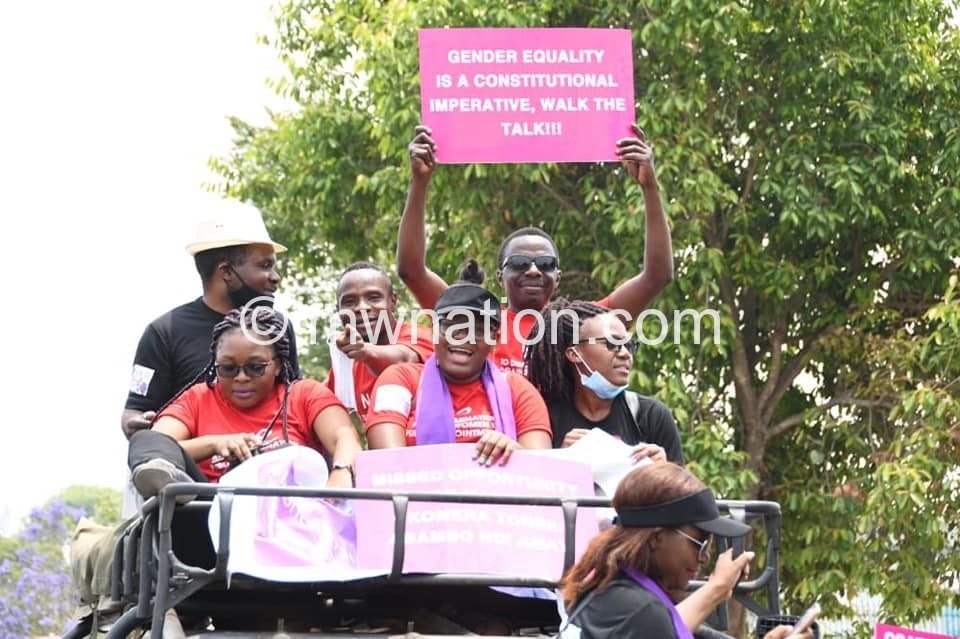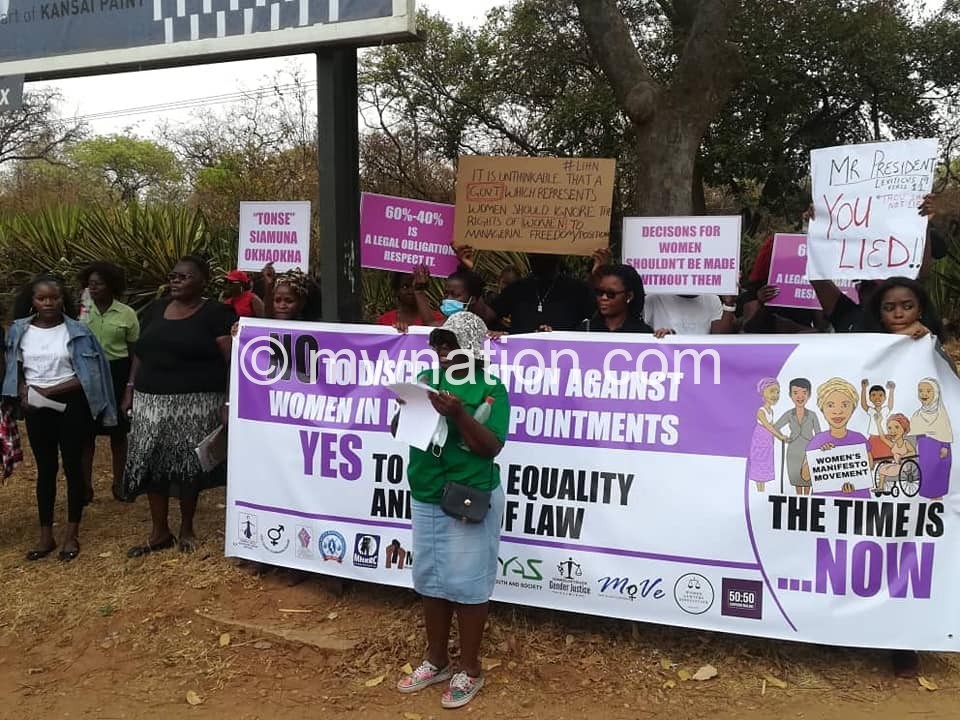Women march against Chakwera’s gender insensitivity
Women from all sectors of society took to the streets of Lilongwe and Blantyre yesterday to express their anger at President Lazarus Chakwera for promoting a system that oppresses women in the country.
But presidential press secretary Brian Banda has said Chakwera will attend to all concerns raised by women and as a listening President, he will call for a round table discussion to hear them out.

“He has noted that petitions have been given to relevant authorities and he will wait for the documents to reach his desk and will act accordingly,” he said.
During the protests organised by the Women Manifesto Movement comprising various women empowerment civil society organisations (CSOs), women said they are frustrated ‘that they have to be begging to be appointed into various public positions when the law on equal representation is clear.’
They said they are angered that Chakwera—who promised to bring change to the system during his campaign in the run up to June 23 Fresh Presidential Election—has failed to fulfill the Gender Equality Act (GEA) requirement of 60:40 representation of either sex in his public appointments.
Recent board appointments by the President announced in a press statement signed by Secretary to the President and Cabinet Zanga Zanga Chikhosi, has only nine out of over 60 boards chaired by women.

In a special briefing on Monday at Kamuzu Palace to mark his 100 days in office, Chakwera defended the appointments, saying he will achieve the 60: 40 representation during his term as it will be a step-by-step approach.
But he also claimed that there are few women who are well-qualified, challenging journalists to provide him with names to make such appointments.
One of the demonstration’s organisers Barbara Banda, who is also Non-Governmental Organisations-Gender Coordination Network (NGO-GCN) chairperson, said that’s why women yesterday took to the streets to raise awareness that there are enough qualified women in the country to be appointed into various State institutions.
“We want to encourage dialogue and see more women appointed into public institutions,” she said after leading a march in Lilongwe which was joined by lawyers, feminists and well-wishers.
President has our names
Banda said Chakwera’s proposal to provide him with names of qualified women is odd, arguing the country’s universities have names of women graduates in all fields and that the President can easily access such information.
Said Banda: “The President has our names and we don’t have to give a list of women who are capable of taking up positions as if the President asked for a list of men that he appointed.”
She bemoaned what she termed as a tendency by some men to only need help from women during hard times such as political struggle only to dump them when catapulted into power.
The grounds in a petition which Banda read out at the end of the march in Lilongwe, include a demand for compliance for the rule of law by the appointing authorities and respecting the provision in Gender Equality Act.
Private practice lawyer, who joined the march in Lilongwe, Khwima Mchizi, said women in the country are justified to raise concerns about a system that oppresses women and a government that does not respect the rule of law on equal representation.
“Women today are not even supposed to be here begging to be appointed into public positions. The law should and must be respected at all times. We are saying no to discrimination,” he said, hoisting a placard reading ‘The law is clear, just do the right thing!’
The protesters marched from Kamuzu Central Hospital to Parliament Roundabout where a petition was read out. But the group did not proceed to Parliament as initially planned as permission was not granted by the Lilongwe City Council.
We too can
Protesters in Blantyre said the march for gender equality was to show the government and the rest of the world that women too can lead.
Among the notable figures were Assistant Professor Ngeyi Kanyongolo from Women Lawyers Association, Ulemu Kanyongolo from Young Women Feminists, Chancellor College’s Dr Ngome Mwaso and Alice Bwanausi from the Human Rights Defenders Coalition (HRDC).
Scheduled to start at 9am, the protests kicked off 87 minutes later with Women’s Legal Resources Centre executive director Mary Kathewera-Banda leading the group.
She warned that women’s patience in the country is wearing thin: “Before someone dismisses us as not for dialogue and that we ought to have given the administration sometime, then they have to ask the President how patient we have been to the cause. Everyone knows that we have been engaging the powers that be way back from the campaign period.
“They [new government] signed for, not under any duress, that they will promote gender laws when they are ushered into power. Anyone tell me what they have done to their own promises? It is a slap in the face of women and we won’t take it lying down.”
Kathewera Banda, who is also a key member of the Women Manifesto Movement, said she was specifically agitated by what President Chakwera said last Monday that there are few women who are well-qualified in the country.
“The President knows that he could have done better on that one. In fact, we are here in these protests to show that we have, in this very country, able women. Yes, we too can!”
In their petition, submitted to Blantyre City Council through head of human resources Alfred Nyengo, the protesters also demanded that the Malawi Human Rights Commission should monitor the enforcement and implementation of the Gender Equality Act and must condemn the violation of the Act by the Tonse administration.
Commentators have since appealed to government to engage with the women.
“I guess the President and his Vice-President [Saulos Chilima] are fine gentlemen whom the aggrieved groups can engage for a better tomorrow because it is difficult to reverse the various board appointments,” politician-cum-commentator Humphrey Mvula told The Nation on Thursday.
On his part, University of Malawi’s Chancellor College political science lecturer Ernest Thindwa said the appointment of women into positions of influence should not overlook the quality and competence factor.
“While appointing women in positions of influence is critical to social cohesion and national development, it should not be at the expense of quality and competence.
“We need to move away from the quantitative approach to achieving equality and concentrate on measures which can increase both the quality and quantity of a pool of women from which we can tap talent to serve the country,” he said.





